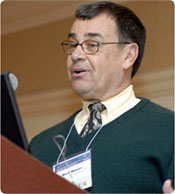| 
Addressing Special Needs of Veterans
By Rebecca A. Clay
When veterans need help, the concerns they express are
often ones that providers find especially challenging.
A panel presentation at "The Road Home: National
Behavioral Health Conference on Returning Veterans and
Their Families" offered an introduction to some
of these issues: post-traumatic stress disorder (PTSD)
and homelessness.
PTSD

Bert Bauer, L.C.S.W. |

Susan J. McCutcheon,
Ed.D., R.N. |
Bert Bauer, L.C.S.W., a social work officer for the
Army Reserve's 3rd Medical Command and a clinical social
worker at Pathways Transition Programs, provided an overview
of PTSD.
A one-time traumatic event can lead to PTSD, he emphasized,
but so can ongoing stress. A harsh climate, austere living
conditions, constant danger, the low tolerance for errors—these
and other stressors add up. "We need to think about
how people get worn down during their deployments,"
said Mr. Bauer.
Some people are at even higher risk. Some are just biologically
predisposed to PTSD, said Mr. Bauer. Past experiences
can also increase risk: People who have already been
traumatized run the risk of being retraumatized during
wartime. "Citizen soldiers"—those serving
in the National Guard or the Reserves—are another
high-risk group. "One day they own a shop; the next
day they get an order and they're off to battle,"
said Mr. Bauer. Both reservists and active-duty personnel
need more preparation about what to expect, he added.
Another potential cause of PTSD is military sexual trauma.
Defined as physical assault of a sexual nature or sexual
harrassment of a threatening character committed by one's
colleagues during military training or service, this
type of trauma is now receiving greater attention, explained
Susan J. McCutcheon, Ed.D., R.N., Program Manager for
Special Projects in the Office of Mental Health Services
at the U.S. Department of Veterans Affairs (VA).
It's important to screen all veterans for military sexual
trauma, added Dr. McCutcheon, noting that the VA has
specialized sexual trauma programs. "Statements
like ‘Violence is common in our society, so I ask
all my patients about this' can help normalize screening,"
she said.
Back to Top
Homelessness
Some veterans don't seek help until PTSD, substance
abuse, and other problems have robbed them of everything,
including their homes.

Carol Davidson,
L.C.S.W., CASAC |
Carol Davidson, L.C.S.W., CASAC, shared what she has
learned about this population as Program Director of
Samaritan Village Veterans Program, a 48-bed residential
treatment program for veterans with drinking or drug
problems and a history of homelessness.
Peer-to-peer assistance lies at the heart of this "therapeutic
community" approach. "We talk so much about
veterans' problems, but not enough about their strengths,
such as their camaraderie," said Ms. Davidson. "Veterans
understand each other in ways no one else can."
That understanding helps veterans overcome a major barrier
to treatment: their unwillingness to talk about secret,
shameful, or literally unspeakable matters with outsiders.
Sharing stories helps veterans make sense of their experiences,
said Ms. Davidson, adding that the great thing about
residential treatment is that participants don't have
to go home after sessions.
"In combat, it's about staying alive and fulfilling
the mission," she explained. "There's very
little time for grieving or expressing feelings." 
See
Photo Gallery »
« See Also—Previous
Article
See Also—The Road Home: National Conference on Returning Veterans & Their Families
« See Part 1: Community Services Provide Safety Net
for Returning Veterans
« See Part 2: Community Services Provide Safety Net
for Returning Veterans
Preventing Suicide among Veterans »
Recovery Month Includes Veterans »
Resources for Veterans »
See Also—Next
Article »
Back to Top
|




